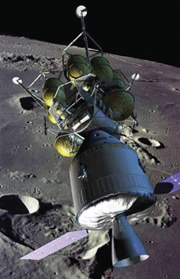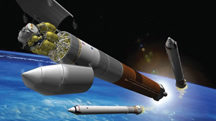Phased Arrays, Aerospace Applications, Digital Imaging

ASTM International Committee E07 on Nondestructive Testing has recently approved three new standards on phased arrays, polymer matrix composites for aerospace applications and digital imaging. The committee will be meeting in Plantation, Fla., Jan. 24-28, and welcomes participation in its standards developing activities.
Ultrasonic Methods
Thousands of portable phased array units, used for weld inspections, have now been sold worldwide. There are many benefits to these devices, including speed, cost, imaging, flexibility and setups, along with no radiation, licensing or contamination. Despite these advantages, there was not a universal inspection procedure for phased array inspection of welds. A new standard, E2700, Practice for Contact Ultrasonic Testing of Welds Using Phased Arrays, provides such an inspection test.
E2700 was developed by Subcommittee E07.06 on Ultrasonic Method. According to Michael Moles, senior technology manager, Olympus NDT, and an E07 member, E2700 will be most useful to inspection companies that need to write and follow procedures and to end users and regulators who need to establish practices for the inspection companies.
"E2700 will be very helpful as it covers the relevant aspects for most weld inspections, so details will not be ignored or forgotten," says Moles.
Specialized NDT Methods
A new guide gives an introductory overview that describes how mature and established nondestructive testing methods that are routinely used by industry are applied specifically to the characterization of polymer matrix aerospace composites. E2533, Guide for Nondestructive Testing of Polymer Matrix Composites Used in Aerospace Applications, is under the jurisdiction of Subcommittee E07.10 on Specialized NDT Methods.
"The practical value of E2533 is that the major, accepted nondestructive testing methods are covered in a single document," says Jess Waller, a materials scientist at GeoControl Systems Inc. and a member of E07.10. "Primary users of the standard will be the aerospace industry and its primary contractors in building spacecraft and launch vehicles for present and future NASA programs." This includes all government and industrial entities involved in:
- Product and process design and optimization;
- Online process control;
- After manufacture inspection;
- In-service inspection; and
- Health monitoring of polymer matrix aerospace composites.
Waller notes that E2533 can be used to select an appropriate nondestructive test depending on the type of flaw a user is trying to detect and to provide instruction on where in the life cycle of a composite material or component a particular test can be used. In addition, the advantages and limitations of each of the major nondestructive tests are discussed, with reference to relevant standards.

The aerospace industry will use new standards approved by Committee E07 on Nondestructive Testing in the development of future spacecraft.
Digital Imaging and Communication in Nondestructive Evaluation
A new standard developed by Subcommittee E07.11 on Digital Imaging and Communication in Nondestructive Evaluation (DICONDE) will fill a need in the nondestructive testing industry for a transparent and industry standard data format with which to store digital inspection data.
E2663, Practice for Digital Imaging and Communication in Nondestructive Evaluation (DICONDE) for Ultrasonic Test Methods, will be used by manufacturers to develop ultrasonic test equipment that communicates and stores inspection data in a nonproprietary format that will be used for decades.
"Critical national and commercial infrastructure requires long-term data management solutions for inspection data," says Patrick Howard, GE Aviation, who notes that, in the United States, nuclear power plants are typically licensed for 40 years but can obtain an operating extension for an additional 20 years.
"Over such long time periods, inspection equipment is replaced with new models, and equipment vendors may go out of business while the need to access the data acquired with the equipment remains," says Howard. "There is a need to promote interoperability as inspection equipment is modernized to provide long-term data access."
E2663 will serve as a companion standard to E2339, Practice for Digital Imaging and Communication in Nondestructive Evaluation (DICONDE). While E2339 addresses digital data transmission and storage for all nondestructive evaluation modalities, E2663 addresses digital data transmission and storage specific to ultrasonic testing.
Howard also notes that E07.11 is now at work on the following related proposed practices:
- WK17435, Digital Imaging and Communication in Nondestructive Evaluation (DICONDE) for X-Ray Computed Tomography (CT) Test Methods;
- WK17436, Digital Imaging and Communication in Nondestructive Evaluation (DICONDE) for Digital Radiographic (DR) Test Methods;
- WK20537, Digital Imaging and Communication in Nondestructive Evaluation (DICONDE) for Eddy Current Test Methods; and
- WK22505, Digital Imaging and Communication in Nondestructive Evaluation (DICONDE) for Computed Radiography (CR) Test Methods.
CONTACT
Technical Information: (E2700) Michael Moles, Olympus NDT, Waltham, Mass.
Phone: 416-831-4428
(E2533) Jess Waller, NASA White Sands Facility, Las Cruces, N.M.
Phone: 575-524-5249
(E2663) Patrick Howard, GE Aviation, Cincinnati, Ohio
Phone: 513-552-4646
ASTM Staff: George Luciw
Phone: 610-832-9710
 SN Home
SN Home Archive
Archive Advertisers
Advertisers Masthead
Masthead RateCard
RateCard Subscribe
Subscribe Email Editor
Email Editor